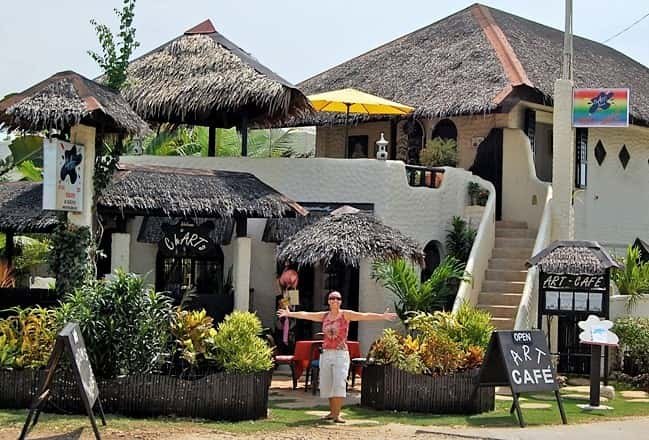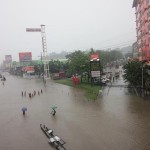Abseits vom Trampelpfad – Off the Beaten Track – the Book from Sonja Schlenther

Abseits vom Trampelpfad – Off the Beaten Track is a striking book from Sonja Schlenther. Sonja’s path crossed my life several times in the past 10 years. Sonja lived mostly over in Panglao and I enjoyed my days in Camiguin. We are both island hoppers. So we have common friends here and there. This is why we always heard from each other even if we didn’t meet for a while.
I think it had been last New Year’s eve, when we both were with our friends and guests at Kurma Eco Beach Lodge in Yumbing, Camiguin. Sonja told me that she soon would publish a book about her life with focus on her life in the Philippines. I pre-ordered a hard-copy.
Abseits vom Trampelpfad – A book about a dream that became true

Sonja visited in her life already 77 counties. She worked as hair stylist, make-up artist, travel agent, animator, travel agent on cruise ships and yoga trainer. During her work and private travels she started to dream to build her own boutique hotel. She did not only dream, she did the real thing.
In the book’s first part she writes about her past life, her jobs, her dreams and her environment. In the second part Sonja tells the reader of her ups and downs when making her dream to become true here in the Philippines – on Panglao island.
Sonja wrote her first book in her mother tongue, German. After each chapter she gives hints and recommendations for everybody who also wants to create a life off the beaten tracks.
Even if I had made some similar experiences, I liked to read the book. It is easy reading and full of humour. Reading between the lines, you catch often a wink from Sonja’s eyes. So, I wanted to share the book with my friends. But unfortunately most of my friends here speak English.
An experiment: Translate from German to English
How could I share this interesting yet funny book with my friends? Translate! We discussed the idea, but Sonja’s partner said, that he would rather translate it into Chinese language. A subtle joke!
I then told Sonja that we could start an experiment. There is a fine AI translation tool on the Internet. It’s called DeepL. In my opinion it is today’s best translation software. I often use it for a first version translation of articles. I then refine this first version to give the text also a soul.
Sonja agreed and here is the result. Sonja chose chapter 23: “It’s more fun in the Philippines”. First the English version, then the German one.
If you understand Shakespeare’s language
2008 started thrilling and exciting, because I had finally opened my long-awaited Art-Café in March! Already during the preparatory phase in Sardinia/Italy I had thought about giving the resort a motto. I didn’t want to build another diving resort as usual on the island. Something new had to be done. Something, which did not exist in this region yet. A pioneer project: an unique ART-Café!
I had background knowledge of my own and was strongly influenced by my mother’s family. I had inherited the interest and talent for artistic things and creativity from them. This factor helped me a lot with the implementation. I would kill two birds with one stone: having exceptional decorations for the resort and at the same time provide a platform for local artists to exhibit their work. Nowhere in the region I had seen galleries or shops selling paintings and sculptures. So I wanted to enter this niche market.
The motto ART was also anchored in the name of the resort: ChARTs. This was shortened from Chill-out Café & Art Resort. It was easy to pronounce and remember. Plus it was quickly found on the Internet and there was no other hotel with this name yet. All considerations I made before the object was even built. I invited various artists from the region to exhibit some of their works as commission goods in the hotel complex and acquired my favorite pieces for a small, private collection. The artists often came by to see me when they needed money once again. Most of them could live from their art works more or less badly, so as time goes by I bought more and more pictures.
At this point I would like to tell you what vision I had with this project from the beginning: I wanted to create a meeting place where not only travelers from all over the world, but also local artists and other interesting people – regardless of their cultural, religious or other background – could meet and exchange ideas in a relaxed atmosphere. A marketplace for creative ideas and projects! It was more and more important to me to live my lifestyle the way I thought it would be meaningful and satisfying than to earn the big money. If I had only been interested in wealth, I probably should have stayed in Europe better. Money was and is – for me – a very important side effect that finances my livelihood and dreams. Dreams of travelling, discovering new things/places and the realization of unusual projects – if possible away from the mainstream.
Back to the actual story. To advertise the resort, I also visited various tourism fairs, where I usually set up a tiny little booth with homemade decorations. As neighbors I had the big hotel chains with their professionally made advertising material. I didn’t care, because I enjoyed advertising ‘my baby’ and making new contacts, especially to bigger cities in the Philippines. As a result, I was soon able to receive more and more national guests and even some newspapers reported about the new boutique resort in Bohol and me as the resort owner. Slowly it went upwards and the grey clouds disappeared more and more. The years of effort and diligence paid off bit by bit and I saw light again at the end of the tunnel. At that time I lived 150 percent for my small company and was happy, even though I worked a lot. I knew who I was doing this for.
I often thought of the slogan I saw for the first time at a tourism exhibition in Manila, which the country used as advertising: It´s more fun in the Philippines! In fact, the motto was really chosen correctly, which – depending on the situation – could be seen and used quite flexibly. Of course, I also used it in situations where I had nothing to laugh about and where the different mentality of the ‘Pinoys’ made me furious. But overall I had got used to my new surroundings after the first hard years and had arranged myself accordingly. I kept trying to be patient when things were ‘out of stock’ or with a ‘factory defect’ or when I had to do countless follow-ups to get something moving.
Unfortunately the locals are not well known for their diligence and endurance. I had to find that out with my staff, too. Most of the people I hired were very euphoric and eager at the beginning. Unfortunately this energy evaporated quickly, so that I had to accept many change of personnel over the years. Today I can no longer say exactly how many secretaries, waitresses, cooks, housekeepers, masseuses etc. I have trained myself and which of them unfortunately have to be replaced again. Some just disappeared overnight.
In any case, there were several dozen people! That was a common phenomenon. That’s what happened to most of the business owners I knew or heard about. Company loyalty were rare. The Philippine employees had to be touched with velvet gloves and treated very carefully. Especially as a foreigner you irritate people with direct speeches and emotional outbursts. This staff problem should accompany me during my whole resort time. When once again a well-trained person left because she/he could earn a few pesos more in another place or because the family suddenly decided that it would be better if he/she stayed at home rather than work, I often thought unnerved: “It´s more fun in the Philippines!
Not only did I have a lot of trouble with the staff, the guests also made my life sometimes difficult. Initially I had mostly nice individual travelers who appreciated the resort and our above-average effort. Guest relation and a good service was the highest priority, which I had absorbed it since my earliest youth and always practiced it. Then, over the years, the market changed and more and more package tourists came who put quantity above quality. Instead of Westerners who had travelled far, it was mainly Asians from China and Korea who visited our island. Among them there were of course nice people, but some behaved quite strangely with their actions. I was sometimes surprised, although I thought I know all the dodges. A few anecdotes I would like to share at this point. I occasionally tell them to friends, because oddities don’t stop at a resort door. On the contrary: Some people really seem to behave completely different in a hotel than in their own apartment or house.
Following story will explain my statement: We hosted some Asian guests who had booked two rooms for a few days. They were friendly, but hardly understood English. One day I was approached by my employee: ‘Ma´am Sonja, would you like to come and have a look, the guests are washing their clothes in the pool!’ ‘What! They do what?’, I replied dumbfounded. I couldn’t believe it, ran quickly out of the office and went through our tropical garden to the pool.
Indeed! When I arrived, I saw two Asian women soaping some of their clothes. At the edge of the pool there were more soaped parts waiting to be washed out. In MY pool! One of the ladies stood in knee-deep water and was washing a T-shirt. I had to rub my eyes to realize that I wasn’t dreaming. I didn’t know exactly what to say about this scene. But I had to do something, that was clear. So I approached the guests – half grinning, half angry – and addressed them in a controlled friendly manner: ‘Hello, please don´t wash your clothes inside the pool! Our hotel offers a laundry-service or you can bring your things to another laundry shop in town as you wish.’ Surprised both women looked up, smiled friendly, but continued with their work.
‘Oh no, this can’t be happening,’ I thought annoyed. Obviously, they didn’t understand anything. I looked around and I saw one of the women’s husband sitting on their terraces. He did understand reasonably English. I asked him to tell the ladies to stop washing in the pool. To my relief he understood and translated quickly into their language. Well, finally, the ladies had understood: They came out of the pool together with the laundry and nodded friendly again, not guilty at all. I thanked them and returned to my office shaking my head. Strange things sometimes happened. I thought this matter had been settled, but half an hour later my cleaning lady appeared again. ‘Ma´am Sonja, look again what the guests have done now.’ On the way to the swimming pool, my cleaning lady told me that the Asian ladies had come to them into the laundry and ordered some extra soap. Later they wanted to hang up their wet laundry in the laundry yard. Since this area was actually not accessible for guests and we had anyway not enough space for our own hotel laundry (we gave it outside), my employee had rejected their wish friendly. The ladies disappeared again.
Once more I came to the pool, where I had a funny picture. Without further ado, the guests had taken the towel stands of ALL nine rooms and ‘nicely’ draped them in the sun. They also seemed to have collected all the hangers from the rooms. For this they had to have gone into the empty guest rooms, which were open for ventilation, and taken them out of the cupboards. Now all bamboo stands with a dozen clothes hangers of dripping laundry, good for a ten-headed family, stood around the swimming pool. It looked like a laundry shop and not like being in a boutique resort.
Ufff, what should my other guests think? Suddenly I remembered that new guests, whose rooms had just been looted, would arrive that day – maybe every moment! Of course my employees didn’t dare to say anything, so it was me, the ‘boss’, who had to ask the Asians politely to take their laundry off the stands. As a compromise I offered that they could hang up their clothes in the cramped laundry yard. ‘The important thing was that the stuff had disappeared from the pool and the garden’, I thought and hoped that the topic had finally been finished.
I was proven wrong. After my cleaning lady came back from her lunch break, she asked me again to come with her. “What’s the matter?” I said angrily, as I was in the middle of difficult accounts and didn’t really want to be disturbed. I was preparing myself for another scene at the pool, but everything was okay there. The bamboo stands had disappeared and the pool water looked clean again, at least not crowned by foam.
Instead I got another funny picture and I regret not taking a picture of it until today. May you believe me even without proof. Between the two main buildings now several clotheslines were stretched and there blew a hundred garments in the light wind of the midday heat. “Oh dear,” I said out loud. Why hadn’t they hung the wet things up in the laundry yard and instead put their own clotheslines in the middle of the resort? Not only did they block a staircase, but they also conveyed anything but an artistic hotel image. At this moment, my receptionist called: ‘Ma’aaaam, the new guests are coming!’
This time I became more vigorous and instructed my cleaning lady to return the laundry to the courtyard as quickly as possible and to guard them with eagle-eyes. I instructed the caretaker to remove the clotheslines. I made it unmistakably clear to the guests, who stood somewhat disbelievingly and irritated on their terraces, that such actions were not permitted in my resort. I think they were a little shocked by my slightly sharper tone, but nodded as if they understood me. I guess they didn’t understand why I was upset. I just say: It´s more fun in the Philippines! 😉
Not that this story was a real drama, because I always found the story very funny afterwards, but it was typical in my varied and unpredictable everyday life as a resort owner. I could tell some more episodes. Another one, when guests took the curtains off their windows one night to use them as blankets. They complained the next day that there were no thick blankets in the room. They did not come up with the idea of setting the air conditioning from 16 degrees to a more pleasant temperature.
Or I had to add another hint to my general house rules when a Filipino family moved in with complete cookware, rice cooker and gas stove with wok and set it up as a temporary kitchen on their room terrace. They started very busy to fry dried fish and meat, so that after a short time the whole hotel smelt horribly. At least my foreign guests and I felt that way and unfortunately I had to interrupt them at their little party. The Filipinos couldn’t believe I was so upset with them, because they were probably used to cook on the terraces of other hotels. These hotels were mostly run by locals who supported their fellow countrymen in this custom – or rather bad -custom. On my place it was from now on forbidden to cook privately on the terraces. There was also an increased risk of fire, besides of unpleasant smells. That didn’t occur to the guests. Unfortunately, I have to say that especially Asians were and still are often resistant when it comes to complying with regulations.
But some European guests gave me unpleasant memories, too. Unpaid bills and unjustified cancellations happened from time to time. Or damage to the interior, which was often done in a nightly booze. But one didn’t want to remember the next day, and certainly didn’t want to pay for damages. Simply the normal everyday life of a hotel. Such situations weren’t nice and unfortunately they increased in the course of my tourism career.
I can still remember a particularly creative case. I had decided to install minibars with cold drinks in the rooms. In addition, a small woven basket of snacks and sweets was available for the guests. Normally these things were eaten gladly, were thus a good additional income and it was cheated little. Once, however, my housekeeping called me into a guest room and brought my attention to the contents of a basket. The guests had already checked out and left. Actually the minibar and the contents of the basket should be checked upon check-out. But on the outside both looked as if nothing had been touched and therefore nothing was noted at the check-out procedure.
Only when cleaning the room the housekeeping did check the contents of the basket. At that time, the it consisted of a chocolate bar, a metal box with nuts and a bag of chips. All three things actually looked quite normal to my eye, but on closer inspection I was amazed to see that the chocolate bar had been draped as if it was full, but if you touched it, it was empty! Also the metal lid of the nuts box had been tinkered so that the can looked like new. Even the empty bag with chips had been filled with air and glued with a transparent tape strip (from our office!). ‘Unbelievable, but quite sophisticated’, I astonished.
Alarmed we looked at the contents of the small refrigerator with the drinks. Usually all our cans and bottles were marked with a black dot to know that they were the drinks we filled. ‘Because to save a few pesos, some people made a huge effort,’ I thought. In this case the bottles were filled up with tap water and the empty soft drink cans had been turned over and pushed back in the fridge. The beer in the bottles were also replaced by water and closed again with a lid. It was almost surprising that the ice cubes in the freezer had not yet been replaced! At first sight everything looked perfectly camouflaged! I didn’t blame my employees, who had only looked briefly into the fridge upon check-out. We had never seen anything like this before. But we learned that there were always surprises in the daily life of a resort.
After this incident, we were more cautious about check-outs, but such a case never happened again. When I think about how long the guests had been busy preparing everything so that it looked unused? For what amount? Maybe a total of 10 to 15 Euros? Imaginative, our guests, I had to admit. Can you guess, dear reader, what will come next? Yes, exactly: It´s more fun in the Philippines! 😊
Translated with the help of www.DeepL.com/Translator

Das Original in Goethes Sprache
2008 begann spannend und aufregend, denn ich hatte im März endlich mein lang ersehntes Kunst-Café eröffnet! Schon in der Vorbereitungsphase auf Sardinien hatte ich mir überlegt, dem Resort ein Motto zu geben. Ich wollte nicht noch ein weiteres Tauch-Resort wie auf der Insel üblich bauen. Etwas Neues musste her. Etwas, das es in dieser Region noch nicht gab. Ein Pionierprojekt: ein ART-Café!
Ich hatte selber Hintergrundwissen und war durch meine Familie mütterlicherseits stark beeinflusst. Ich hatte das Interesse und Talent für künstlerische Dinge und Kreativität von ihnen geerbt. Diese halfen mir jetzt sehr bei der Umsetzung. Ich würde zwei Fliegen mit einer Klappe schlagen: außergewöhnliche Dekorationen für das Resort haben und gleichzeitig lokalen Künstlern eine Plattform zum Ausstellen ihrer Werke bieten. Nirgendwo hatte ich in der Region Galerien oder Geschäfte gesehen, die Bilder und Skulpturen zum Verkauf anboten. Somit wollte ich in diesen Nischenmarkt einsteigen.
Das Motto Kunst war auch im Resortnamen verankert: ChARTs. Dieser wurde aus Chill-out Café & Art Resort zusammengekürzt. Man konnte ihn gut aussprechen und sich einfach merken. Man fand ihn schnell im Internet und noch gab es kein anderes Hotel mit diesem Namen. Alles Überlegungen, die ich anstellte, bevor das Objekt überhaupt entstand. Ich lud diverse Künstler der Region ein, einige ihrer Werke als Kommissionsware in der Hotelanlage auszustellen und erwarb meine Lieblingsstücke für eine kleine, private Sammlung. Oft kamen die Künstler bei mir vorbei, wenn sie mal wieder Geld brauchten. Die meisten konnten jedenfalls mehr schlecht als recht von ihrer Kunst leben, sodass ich im Laufe der Zeit mehr und mehr Bilder erwarb.
An dieser Stelle möchte ich gerne erzählen, welche Vision ich mit diesem Projekt von Anfang an hatte: Ich wollte einen Meetingplatz kreieren, an dem sich nicht nur Reisende aus aller Welt, sondern auch lokale Künstler und andere interessante Menschen – egal mit welchem kulturellen, religiösen oder sonstigem Hintergrund – treffen und in entspannter Atmosphäre austauschen konnten. Ein Marktplatz der kreativen Gedanken und Projekte! Es ging mir immer mehr darum, meinen Lifestyle so zu leben, wie ich es für sinnvoll und befriedigend erachtete, als das große Geld zu verdienen. Wenn es mir nur um Reichtum gegangen wäre, hätte ich vermutlich besser in Europa bleiben müssen. Geld war und ist – für mich – eine sehr wichtige Nebenerscheinung, die mir meinen Unterhalt und vor allem meine Träume finanziert/e. Träume vom Reisen, Entdecken und ungewöhnlichen Projekten – wenn möglich abseits vom Mainstream.
Wieder zurück zur eigentlichen Geschichte. Um Werbung für das Resort zu betreiben, besuchte ich auch verschiedene Touristikmessen, auf denen ich meist einen klitzekleinen Stand mit selbst gebastelten Dekorationen aufbaute. Als Nachbarn hatte ich die großen Hotelketten mit ihren professionell gefertigten Werbemitteln. Das war mir egal, denn es machte mir Spaß, für mein Baby zu werben und neue Kontakte, vor allem zu größeren Städten, aufzubauen. Infolgedessen konnte ich bald überregionale Gäste empfangen und es wurde sogar in einigen Zeitungen von dem neuen Boutique-Resort in Bohol und mir als Resort-Chefin berichtet. So langsam ging es aufwärts und die grauen Wolken verschwanden mehr und mehr. Die Jahre der Mühen und des Fleißes zahlten sich Stück für Stück aus und ich sah wieder Licht am Ende des Tunnels. Ich lebte damals zu 150 Prozent für mein kleines Unternehmen und war happy, auch wenn ich sehr viel arbeitete. Ich wusste ja, für wen ich das tat.
Oft dachte ich an den Slogan, den ich das erste Mal auf einer Tourismusausstellung in Manila gesehen hatte und mit dem das Land die Werbetrommel rührte: It´s more fun in the Philippines! In der Tat war das Motto wirklich richtig gewählt, welches – je nach Situation – recht flexibel gesehen und eingesetzt werden konnte. Ich benutzte es natürlich auch in Situationen, in denen ich nichts zu lachen hatte und mich die Mentalität der Pinoys zur Weißglut brachte. Aber im Großen und Ganzen hatte ich mich nach den ersten harten Jahren an meine neue Umgebung gewöhnt und mich entsprechend arrangiert. Ich versuchte mich weiterhin in Geduld zu üben, wenn Dinge mal wieder out of stock oder mit einem factory defect waren oder ich unzählige follow-ups (ständige Nachfragen) machen musste, damit sich etwas in Bewegung setzte.
Leider sind die Einheimischen nicht gerade für ihren Fleiß und ihr Durchhaltevermögen bekannt. Das musste ich auch bei meinem Personal feststellen. Die meisten, die ich einstellte, waren am Anfang noch sehr euphorisch und bemüht. Leider verpuffte diese Energie schnell, sodass ich im Laufe der Jahre viele Personalwechsel hinnehmen musste. Ich kann heute nicht mehr genau sagen, wie viele Sekretärinnen, Kellnerinnen, Köchinnen, Putzfrauen, Masseurinnen etc. ich selber ausgebildet habe und welche davon leider wieder ausgetauscht werden mussten. Manche verschwanden einfach über Nacht. Es waren auf jeden Fall mehrere Dutzend Menschen! Das war ein übliches Phänomen. So erging es den meisten Geschäftsbesitzern, die ich kannte oder von denen ich anderweitig hörte. Loyalität und Firmentreue waren selten. Die philippinischen Angestellten mussten mit Samthandschuhen angefasst und sehr vorsichtig behandelt werden. Vor allem als Ausländer eckt man mit direkten Ansprachen und emotionalen Ausbrüchen an bzw. es irritiert die Leute. Dieses Personalproblem sollte mich meine gesamte Resortzeit hindurch begleiten. Wenn wieder einmal eine gut ausgebildete Kraft wegging, weil sie an einem anderen Ort ein paar Pesos mehr verdienen konnte oder weil die Familie plötzlich beschloss, dass es besser wäre, wenn sie lieber zu Hause blieb, als zu arbeiten, dachte ich oft entnervt: „It´s more fun in the Philippines!“
Ich hatte nicht nur meine liebe Mühe mit dem Personal, auch die Gäste machten mir bisweilen mein Leben schwer. Anfänglich hatte ich überwiegend nette Individualreisende, die das Resort und unsere überdurchschnittliche Mühe schätzten. Gästeservice stand an höchster Stelle, so hatte ich das seit frühester Jugend in mir aufgesogen und immer praktiziert. Dann veränderte sich im Laufe der Zeit der Markt und es kamen immer mehr Pauschaltouristen, die Quantität über Qualität stellten. Statt weit angereister Westler besuchten nun überwiegend Asiaten aus China und Korea unsere Insel. Darunter gab es natürlich auch nette Leute, aber manche benahmen sich mit ihren Aktionen recht seltsam. Ich geriet so manches Mal ins Staunen, obwohl ich dachte, mit allen Wassern gewaschen zu sein. Ein paar Anekdoten möchte ich an dieser Stelle zum Besten geben. Diese erzähle ich gelegentlich Freunden und Bekannten, weil kuriose Dinge auch vor einer Resorttüre nicht haltmachen. Im Gegenteil: Manche Menschen scheinen sich in einem Hotel wirklich total anders zu benehmen als zu Hause in ihrer eigenen Wohnung.
Eine Geschichte begab sich folgendermaßen: Wir beherbergten einige asiatische Gäste, die zwei Zimmer für einige Tage gebucht hatten. Sie waren freundlich, verstanden allerdings kaum Englisch. Eines Tages wurde ich von meiner Angestellten angesprochen: „Ma´am Sonja, möchtest du mal schauen kommen, die Gäste waschen gerade ihre Kleidung im Pool!“ „Was? Die machen was?“, erwiderte ich entgeistert. Ich konnte es kaum glauben, lief schnell aus dem Büro und durch unseren kleinen Tropengarten zum Pool.
Tatsächlich! Als ich dort ankam, sah ich zwei Asiatinnen, die gerade seelenruhig dabei waren, einige Kleidungstücke einzuseifen. Am Poolrand lagen bereits einige weitere, eingeseifte Teile und warteten darauf ausgewaschen zu werden. In MEINEM Pool! Eine der Damen stand auf den Schwimmbadstufen im knietiefen Wasser und wusch gerade ein T-Shirt. Ich musste meine Augen reiben, um mir klarzumachen, dass ich nicht träumte. Ich wusste nicht genau, was ich zu dieser Szene sagen sollte. Aber ich musste etwas unternehmen, das war klar. Somit ging ich – innerlich halb grinsend, halb wütend – auf die Gäste zu und sprach sie freundlich beherrscht an: „Hello, please don´t wash your clothes inside the pool! Our hotel offers a laundry-service or you can bring your things to another laundry shop in town as you wish.” Ich bat sie darum, ihre Wäsche doch bitte nicht im Swimmingpool zu waschen. Wir würden einen Wäscheservice im Hotel anbieten oder sie könnten sich alternativ an eine der anderen Wäschereien im Ort halten. Überrascht sahen beide Frauen auf, lächelten mich freundlich an, machten aber mit ihrer Tätigkeit weiter.
„Och nee, das durfte doch nicht wahr sein“, dachte ich genervt. Sie verstanden wohl nur Bahnhof und Abfahrt. Ich sah mich um und mein Blick fiel auf eine der Zimmerterrassen, auf der einer ihrer asiatischen Ehemänner saß und des Englischen einigermaßen mächtig war. Diesen bat ich den Frauen zu erklären, mit dem Waschen im Pool aufzuhören. Zu meiner Erleichterung verstand er mich und übersetzte schnell. Na, endlich, die Damen hatten es jetzt wohl kapiert: Sie kamen mit der Wäsche aus dem Pool und nickten wieder freundlich, keineswegs schuldbewusst. Ich bedankte mich und kehrte kopfschüttelnd in mein Büro zurück. Sachen gab´s. Ich dachte, die Angelegenheit hätte sich erledigt, aber eine knappe halbe Stunde später erschien meine Putzfrau erneut. „Ma´am Sonja, schau noch mal, was die Gäste jetzt gemacht haben.“ Auf dem Weg zum Schwimmbad, erzählte mir meine Putzfrau, dass die Asiatinnen zu ihnen in die Wäscherei gekommen wären und extra Seife bestellt hätten. Später wollten sie dann auf dem Hof der Wäscherei ihre nasse Wäsche aufhängen. Da dieser Bereich für Gäste eigentlich nicht zugänglich war und wir eh zu wenig Platz für unsere eigene Hotelwäsche hatten (wir ließen diese extra auswärts waschen), hatte meine Angestellte ihren Wunsch freundlich abgelehnt. Die Damen waren daraufhin wieder mit ihren nassen Sachen abgezogen.
So kam ich also erneut zum Pool, wo sich mir ein lustiges Bild bot. Kurzerhand hatten sich die Gäste sämtliche Handtuchständer ALLER neun Zimmer gemopst und diese „nett“ um den Pool herum in der Sonne drapiert. Sie schienen auch sämtliche Kleiderbügel aus den Zimmern eingesammelt zu haben. Dafür mussten sie zuvor in die leeren, zum Lüften offen stehenden Gästezimmer gegangen sein und sie dort aus den Schränken geholt haben. Denn nun standen alle Bambusständer mit jeweils einem guten Dutzend Kleiderbügel mit tropfender Wäsche, die einer zehnköpfigen Großfamilie alle Ehre gemacht hätte, um das Schwimmbad herum. Es sah aus wie in einer Reinigung und nicht wie in einem gepflegten Boutique-Resort.
Uff, was sollten denn meine anderen Gäste denken? Siedend heiß fiel mir in diesem Moment ein, dass an diesem Tag noch neue Gäste, deren Zimmer gerade geplündert worden waren, ankommen würden. Meine Angestellten trauten sich natürlich nicht, etwas zu sagen und somit musste die Chefin selber ran und die Asiatinnen höflichst bitten, ihre Wäsche doch bitte wieder von den Ständern zu nehmen. Als Kompromiss bot ich an, sie könnten eben doch ihre vermaledeite Wäsche im beengten Wäscherei-Hof aufhängen. „Hauptsache das Zeug war aus dem Pool und dem Garten verschwunden“, dachte ich und hoffte, dass das Thema endlich gegessen war.
Ich hatte mich getäuscht. Nachdem meine Putzfrau von ihrer Mittagspause wiederkam, bat sie mich erneut, mit ihr mitzukommen. „Was ist denn jetzt schon wieder los?“, sagte ich verärgert, da ich mich inmitten schwieriger Abrechnungen befand und eigentlich nicht gestört werden wollte. Ich bereitete mich innerlich schon wieder auf eine Szene am Pool vor, aber dort war alles okay. Die Wäscheständer waren verschwunden und das Schwimmbadwasser sah auch wieder sauber aus, zumindest nicht mehr von Schaum gekrönt.
Stattdessen bot sich mir erneut ein lustiges Bild und ich bereue es bis heute, davon kein Foto gemacht zu haben. Man möge es mir auch ohne Beweis glauben. Zwischen den beiden Hauptgebäuden waren jetzt mehrere Wäscheleinen gespannt und es wehten gefühlte hundert Kleidungsstücke im leichten Wind der Mittagshitze. „Ach herrje!“, stieß ich hervor. Wieso hatten sie denn die nassen Sachen nicht im Wäschehof aufgehängt und stattdessen ihre eigenen Wäscheleinen inmitten des Resorts aufgespannt? Sie versperrten damit nicht nur einen Treppenaufgang, sondern vermittelten auch alles andere als ein kunstvolles Hotelbild. In diesem Moment erschall der Ruf meiner Rezeptionistin: „Ma´aaaam, die neuen Gäste kommen!“
Dieses Mal wurde ich energischer und wies meine Putzfrau an, die Wäscheteile so schnell wie möglich wieder in den Hof zum Trocknen zurückzubefördern und sie dort mit Argusaugen zu bewachen. Den Hausmeister wies ich an, die Wäscheleinen zu entfernen. Den Asiaten, die etwas ungläubig und irritiert auf ihren Terrassen standen, machte ich unmissverständlich klar, dass solcherlei Aktionen nicht in meinem Resort gestattet waren. Ich glaube, sie waren über meinen etwas schärferen Ton ein wenig erschrocken, nickten aber, als hätten sie mich verstanden. Ich vermute, sie haben nicht kapiert, warum ich mich aufregte. Ich sage nur: It´s more fun in the Philippines! 😉
Nicht dass es sich bei dieser Geschichte um ein wirkliches Drama handelte, denn ich fand die Story im Nachhinein immer zum Schmunzeln, aber sie war eben typisch in meinem abwechslungsreichen und unberechenbaren Alltag als Resortchefin. Ich könnte noch so manche Episode zum Besten geben. Zum Beispiel die, als Gäste eines Nachts die Vorhänge von ihren Fenstern abnahmen, um sie als Zudecken zu benutzen. Sie beschwerten sich tags darauf, es gäbe keine dicken Wolldecken im Zimmer. Auf die Idee, die Klimaanlage von 16 Grad auf angenehmere Temperaturen zu stellen, kamen sie dabei nicht.
Oder ich musste einen weiteren Hinweis in meine allgemeine Übersicht an Houserules hinzufügen, als eine philippinische Familie mit komplettem Kochgeschirr, Reiskocher und Gasherd mit Wok anrückte und diese als provisorische Küche auf ihrer Zimmerterrasse aufbaute. Sie fingen an, wie wild Trockenfisch und Fleisch zu frittieren, sodass nach kürzester Zeit das ganze Hotel entsetzlich stank. Zumindest empfanden das meine ausländischen Gäste und ich so und ich musste sie leider bei ihrer kleinen Feier unterbrechen. Die Filipinos verstanden die Welt nicht mehr, denn sie waren es wohl von anderen Hotels gewohnt, dass es ihnen dort gestattet wurde, auf den Terrassen zu kochen. Diese Hotels wurden meist von Einheimischen geführt, die ihre Landsleute in dieser Sitte – oder besser Unsitte – unterstützten. Bei mir war es jedenfalls fortan untersagt, auf den Terrassen privat zu kochen oder Feuer zu machen. Es bestand auch eine erhöhte Brandgefahr nebst der Geruchsbelästigung. Das kam den Gästen nicht in den Sinn. Leider muss ich sagen, dass besonders Asiaten, was das Einhalten von Regelungen angeht, oft resistent waren und immer noch sind. Ein allgemeines Problem übrigens und nicht nur in meinem Resort üblich.
Europäische Gäste bescherten mir aber ebenfalls unangenehme Erinnerungen. Unbezahlte Rechnungen und unberechtigte Stornierungen seitens der Gäste gab es immer wieder. Oder Beschädigungen an der Einrichtung, die oft im nächtlichen Suff ausgeführt wurden. An diese man sich aber tags darauf nicht mehr erinnern wollte, schon gar nicht dafür aufkommen. Der normale Alltag eines Hotels eben. Schön waren solche Situationen nicht und sie haben sich bedauerlicherweise auch im Laufe meiner Tourismuskarriere eher vermehrt.
An einen besonders kreativen Fall kann ich mich noch gut erinnern. Ich hatte beschlossen, Minibars mit kalten Getränken in den Zimmern unterzubringen. Zusätzlich stand ein kleiner geflochtener Korb mit Snacks und Süßigkeiten den Gästen zur Verfügung. Normalerweise wurden diese Sachen gerne verzehrt, waren somit ein guter Nebenverdienst und es wurde wenig betrogen. Einmal aber rief mich mein Housekeeping in ein Gästezimmer und machte mich auf den Inhalt des Korbes aufmerksam. Die Gäste hatten bereits ausgecheckt und waren abgereist. Eigentlich sollte beim Check-out die Minibar und der Inhalt des Korbes überprüft werden. Aber nach außen hin sah beides optisch so aus, als wäre nichts angerührt worden und deshalb wurde beim Check-out auch nichts vermerkt.
Erst beim Putzen des Zimmers überprüfte das Housekeeping den Inhalt des Korbes. Dieser bestand damals aus einem Schokoriegel, einer Metalldose mit Nüssen und einer Chipstüte. Alle drei Dinge sahen eigentlich ganz normal für mein Auge aus, aber bei näherem Betrachten stellte ich erstaunt fest, dass der Schokoriegel so drapiert worden war, als wäre er voll, fasste man ihn aber an, war er leer! Auch der Metalldeckel der Nüsse war wieder so hingebastelt worden, dass die Dose wie neu aussah. Selbst die leere Chipstüte war mit Luft gefühlt und mit einem durchsichtigen Tesafilm-Streifen (aus unserem Office!) wieder zugeklebt worden. „Unglaublich und ziemlich raffiniert“, stieß ich erstaunt hervor.
Alarmiert schauten wir den Inhalt des gesamten kleinen Kühlschranks mit den Getränken an. Üblicherweise waren alle unsere Dosen und Flaschen mit einem schwarzen Punkt markiert, um zu wissen, dass es die von uns aufgefüllten Getränke waren. „Wegen einiger Pesos betrieben manche Leute wirklich einen enormen Aufwand“, dachte ich oft. In diesem Fall waren die Flaschen nicht nur ausgetauscht worden, sondern mit Leitungswasser aufgefüllt und die Softdrink-Dosen waren umgedreht und leer nach hinten geschoben worden. Die braunen Bierflaschen waren ebenfalls mit Wasser gefüllt und mit einem Deckel versehen worden. Dass nicht noch die Eiswürfel im Gefrierabteil ausgetauscht worden waren, verwunderte beinahe. Auf den ersten Blick sah alles wirklich perfekt getarnt aus! Ich machte meinen Angestellten, die beim Check-out nur flüchtig in den Kühlschrank geschaut hatten, keinerlei Vorwürfe. So etwas hatten wir alle zuvor noch nicht gesehen, mussten aber feststellen, dass es immer wieder Überraschungen im Resortalltag gab.
Nach diesem Vorfall waren wir bei den Check-outs vorsichtiger, aber so ein Fall kam dann nie wieder vor. Wenn ich daran denke, wie lange die Gäste wohl damit beschäftigt gewesen waren, um alles so zu präparieren, dass es wie unbenutzt aussah? Für welchen Betrag? Vielleicht insgesamt 10 bis 15 Euro? Einfallsreich, unsere Gäste, das musste ich zugeben. Kannst du dir denken, lieber Leser, was nun kommt? Ja, genau: It´s more fun in the Philippines! 😊
Sonja and I are now wondering
Did you read the translated chapter? Did you read the original chapter? Or did you even read both chapters? We two would be happy to read your opinion. Would you be interested to read the whole book in English language?
If you want to buy Abseits vom Trampelpfad in German language, you can get it either directly from the author on Camiguin Island or you can order it on Amazon.







Great story – calls for more…..:-) and the DeepL translator works really fine!
Best regards
Good evening Jürg,
Thank you for your feedback.
Yes, DeepL is at this moment the best translating tool I know.
Translated texts do only need very few corrections.
The only thing that can not yet be translated is the “Wortwitz”.
Intrinsic humour to particular words in a particular context.
But I am sure this also will come with the current exponential development of AI.
If you would like a hard-copy of the book, I can send it by LBC to your home.
I think Sonja is selling it here at PHP 1200 or 1500. I’ll have to ask her.
It is really refreshing to read her.
After having read Sonja’s book the first time, I read again the book “Auswandern – Den Kulturschock überwinden” from Gerhard Knauber.
It’s the same country but two different perspectives.
I had to read Sonja’s book again.
Wishing you a warm tropical night.
Cheers, waebi
Thank you Jürg Weber for your feedback! If you like to continue reading it, I am sure there is a way to support you 🙂
Are you living in the Philippines? If you are in Europe it’s easy or if you using e-book readers (all kinds) you can get online an e-book version…and if you are actually in Camiguin, I can personally give you some issue and dedication “Widmung” :-). Best sunny regards, Sonja